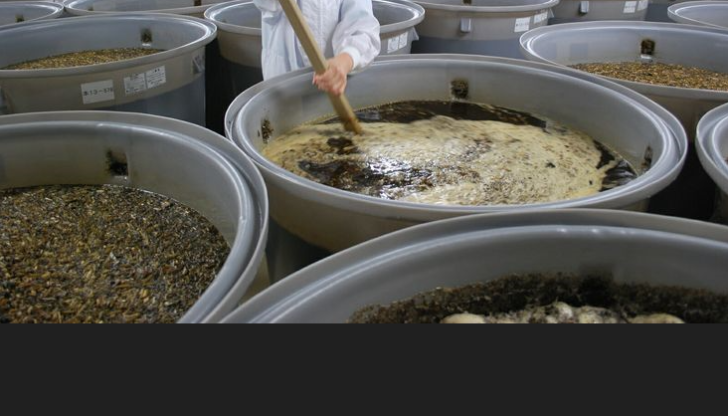複合発酵は、複数の材料を順番に、または同時に発酵させる方法です。
例えると…
-
単一発酵
- 大豆だけで納豆を作るようなもの。一つの材料だけで発酵させるのでシンプル。
-
複合発酵
- 色々なフルーツやハーブを組み合わせて作るハーブコーディアルのようなもの。複数の材料を使うので、それぞれの材料の組み合わせや、発酵させる順番が重要になり、より高度な技術が必要です。
複合発酵のメリット
- それぞれの素材の持ち味を引き出し、より複雑で深い味わいや香りが生まれる。
- 単一発酵では得られない新たな成分や効果が期待できる。
まとめ
複合発酵は、長年の知恵と技術によって生まれた、素材の力を最大限に引き出す発酵方法です。
About Compound Fermentation, in Simple Terms
Compound fermentation is a method where multiple ingredients are fermented, either sequentially or simultaneously.
Analogy:
-
Single Fermentation:
- Like making natto only from soybeans. It’s simple because only one ingredient is fermented.
-
Compound Fermentation:
- Similar to creating a herbal cordial by combining various fruits and herbs. It requires more advanced techniques as multiple ingredients are used, and their combinations and fermentation order become crucial.
Benefits of Compound Fermentation:
- Brings out the unique characteristics of each ingredient, resulting in a more complex and profound flavor and aroma.
- Creates new components and effects that cannot be achieved through single fermentation.
Summary:
Compound fermentation is a fermentation method born from years of wisdom and techniques, maximizing the potential of ingredients.
複合発酵のメリット・デメリット
メリット
- 複雑で豊かな風味と香り: 複数の素材が発酵することで、単一発酵では得られない複雑で奥深い風味や香りが生まれます。
- 新たな成分や効果: 異なる素材の相互作用により、新たな成分が生成されたり、相乗効果で栄養価や機能性が高まる可能性があります。
- 保存性の向上: 発酵過程で生成される酸やアルコールなどが、食品の保存性を高めます。
- 消化吸収の促進: 発酵により、食物繊維やタンパク質などが分解され、消化吸収が良くなります。
- 腸内環境の改善: 発酵食品に含まれる善玉菌が、腸内環境を整え、免疫力向上やアレルギー予防などの効果が期待できます。
デメリット
- 製造工程の複雑さ: 複数の素材の組み合わせや発酵条件のコントロールなど、製造工程が複雑になり、技術や経験が必要です。
- 品質の安定化: 複数の素材や微生物が関与するため、品質の安定化が難しく、熟練した技術が必要です。
- コスト: 製造工程の複雑さや、希少な素材を使用する場合など、コストが高くなる場合があります。
- 風味や香りの好み: 複合発酵による独特の風味や香りが、人によっては苦手と感じられる場合があります。
まとめ
複合発酵は、素材のポテンシャルを最大限に引き出し、新たな価値を生み出す可能性を秘めた技術です。しかし、その複雑さゆえ、技術や経験、コストなど、克服すべき課題も存在します。
もし、さらに詳しく知りたい場合は…
- 特定の複合発酵食品のメリット・デメリット
- 複合発酵における品質管理の方法
- 複合発酵の今後の展望
など、知りたいことを具体的に教えてください。
Advantages and Disadvantages of Compound Fermentation
Advantages
- Complex and Rich Flavor and Aroma: Fermenting multiple ingredients creates a complex and deep flavor and aroma that cannot be achieved with single fermentation.
- New Components and Effects: The interaction of different ingredients may generate new components or enhance nutritional value and functionality through synergistic effects.
- Improved Preservation: Acids and alcohol produced during the fermentation process enhance the preservation of food.
- Promotion of Digestion and Absorption: Fermentation breaks down dietary fiber and proteins, improving digestion and absorption.
- Improvement of Intestinal Environment: Probiotics in fermented foods help regulate the intestinal environment, potentially boosting immunity and preventing allergies.
Disadvantages
- Complexity of the Manufacturing Process: The manufacturing process becomes complex, requiring techniques and experience, such as controlling the combination of multiple ingredients and fermentation conditions.
- Quality Stabilization: Stabilizing quality is challenging due to the involvement of multiple ingredients and microorganisms, necessitating skilled techniques.
- Cost: Costs may increase due to the complexity of the manufacturing process or the use of rare ingredients.
- Flavor and Aroma Preferences: The unique flavor and aroma resulting from compound fermentation may not be appealing to everyone.
Summary
Compound fermentation is a technique with the potential to maximize the potential of ingredients and create new value. However, due to its complexity, there are challenges to overcome, such as techniques, experience, and cost.
If you would like to know more:
- Advantages and disadvantages of specific compound fermented foods
- Quality control methods in compound fermentation
- Future prospects of compound fermentation
Please let me know what you’d like to learn more about specifically.



.jpg)
